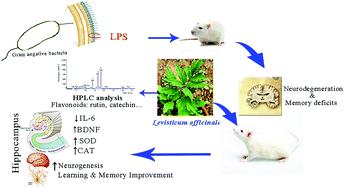当前位置:
X-MOL 学术
›
Food Funct.
›
论文详情
Our official English website, www.x-mol.net, welcomes your
feedback! (Note: you will need to create a separate account there.)
Neuroprotective effects of Levisticum officinale on LPS-induced spatial learning and memory impairments through neurotrophic, anti-inflammatory, and antioxidant properties.
Food & Function ( IF 5.1 ) Pub Date : 2020-07-10 , DOI: 10.1039/d0fo01030h Esmaeil Amraie 1 , Iran Pouraboli 1 , Ziba Rajaei 2
Food & Function ( IF 5.1 ) Pub Date : 2020-07-10 , DOI: 10.1039/d0fo01030h Esmaeil Amraie 1 , Iran Pouraboli 1 , Ziba Rajaei 2
Affiliation

|
Levisticum officinale (Apiaceae) has been identified as a medicinal plant in traditional medicine, with the anti-inflammatory, antioxidant, and anticholinesterase activities. The present study aims to evaluate the effects of Levisticum officinale extract (LOE) on lipopolysaccharide (LPS)-induced learning and memory deficits and to examine its potential mechanisms. LOE was administered to adult male Wistar rats at doses of 100, 200, and 400 mg kg−1 for a week. Later, LPS was intraperitoneally injected at a dose of 1 mg kg−1 to induce neuroinflammation, and treatment with LOE continued for 3 more weeks. Behavioral, biochemical, and molecular analyses were performed at the end of the experiment. Moreover, quantitative immunohistochemical assessments of the expression of Ki-67 (intracellular proliferation marker) in the hippocampus were performed. The results revealed that LPS injection caused spatial memory impairment in the rats. Daily LOE treatment at applied doses for 4 weeks attenuated spatial learning and memory deficits in LPS-injected rats. Furthermore, LPS significantly increased the mRNA expression level of interleukin-6 in the hippocampus, which was accompanied by decreased brain-derived neurotrophic factor (BDNF) mRNA expression levels. Moreover, LPS increased the levels of malondialdehyde, reduced the antioxidant enzyme activities of catalase and superoxide dismutase in the hippocampus, and impaired neurogenesis. However, pre-treatment with LOE at a dose of 100 mg kg−1 significantly reversed the LPS-induced changes, and improved neurogenesis. In conclusion, the beneficial effect of LOE on the improvement of learning and memory could be attributed to its anti-inflammatory and antioxidant activities, along with its ability to increase BDNF expression and neurogenesis in the hippocampus.
中文翻译:

紫薇通过神经营养,抗炎和抗氧化特性对LPS诱导的空间学习和记忆障碍的神经保护作用。
紫叶菊(Apiaceae)已被确认为传统医学中的药用植物,具有抗炎,抗氧化和抗胆碱酯酶的活性。本研究的目的是评估药用药用植物提取物(LOE)对脂多糖(LPS)诱导的学习和记忆缺陷的影响,并研究其潜在机制。对成年雄性Wistar大鼠以100、200和400 mg kg -1的剂量一周服用LOE 。之后,以1 mg kg -1的剂量腹膜内注射LPS。诱导神经发炎,LOE治疗又持续了3周。在实验结束时进行了行为,生化和分子分析。此外,对海马中Ki-67(细胞内增殖标志物)的表达进行了定量免疫组织化学评估。结果表明,LPS注射引起大鼠空间记忆障碍。每天4个星期的剂量LOE治疗可减轻LPS注射大鼠的空间学习和记忆障碍。此外,LPS显着增加了海马中白细胞介素6的mRNA表达水平,并伴有脑源性神经营养因子(BDNF)mRNA表达水平的降低。此外,脂多糖会增加丙二醛的含量,降低海马中过氧化氢酶和超氧化物歧化酶的抗氧化酶活性,并损害神经发生。但是,以100 mg / kg的剂量进行LOE预处理-1显着逆转了LPS诱导的变化,并改善了神经发生。总之,LOE对学习和记忆的改善的有益作用可以归因于其抗炎和抗氧化活性,以及其增加BDNF表达和海马神经发生的能力。
更新日期:2020-07-22
中文翻译:

紫薇通过神经营养,抗炎和抗氧化特性对LPS诱导的空间学习和记忆障碍的神经保护作用。
紫叶菊(Apiaceae)已被确认为传统医学中的药用植物,具有抗炎,抗氧化和抗胆碱酯酶的活性。本研究的目的是评估药用药用植物提取物(LOE)对脂多糖(LPS)诱导的学习和记忆缺陷的影响,并研究其潜在机制。对成年雄性Wistar大鼠以100、200和400 mg kg -1的剂量一周服用LOE 。之后,以1 mg kg -1的剂量腹膜内注射LPS。诱导神经发炎,LOE治疗又持续了3周。在实验结束时进行了行为,生化和分子分析。此外,对海马中Ki-67(细胞内增殖标志物)的表达进行了定量免疫组织化学评估。结果表明,LPS注射引起大鼠空间记忆障碍。每天4个星期的剂量LOE治疗可减轻LPS注射大鼠的空间学习和记忆障碍。此外,LPS显着增加了海马中白细胞介素6的mRNA表达水平,并伴有脑源性神经营养因子(BDNF)mRNA表达水平的降低。此外,脂多糖会增加丙二醛的含量,降低海马中过氧化氢酶和超氧化物歧化酶的抗氧化酶活性,并损害神经发生。但是,以100 mg / kg的剂量进行LOE预处理-1显着逆转了LPS诱导的变化,并改善了神经发生。总之,LOE对学习和记忆的改善的有益作用可以归因于其抗炎和抗氧化活性,以及其增加BDNF表达和海马神经发生的能力。











































 京公网安备 11010802027423号
京公网安备 11010802027423号